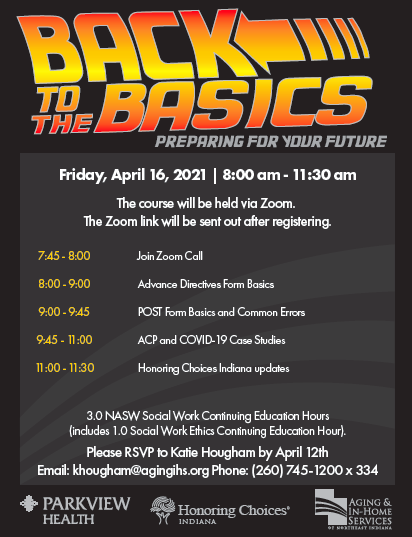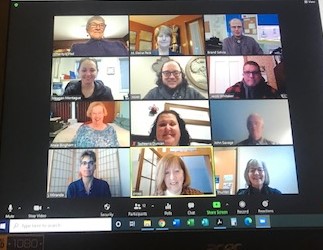
FOR IMMEDIATE RELEASE: 04/05/2022
Greencastle, Indiana.
A healthcare representative is a person chosen to make healthcare decisions, including end-of-life decisions, for someone should that person become unable to make his or her own decisions. This is a very important role. The person who has chosen you trusts you to make the decisions that he or she would make if able.
FOR IMMEDIATE RELEASE: 04/05/2022
Greencastle, Indiana.
A healthcare representative is the person you choose to make healthcare decisions for you if you should become unable to speak or make decisions for yourself. You may legally identify your healthcare representative in an advance directive. If you do not do so, and become unable to make your own healthcare decisions, Indiana law decides who can do this for you according to a priority list. In this situation, your physician will try to contact a representative for you using the priority list. Your health care choices will be made by the person your physician is able to contact.
FOR IMMEDIATE RELEASE: 04/05/2022
Greencastle, Indiana.
In 2021, Indiana legislators passed a new law simplifying Indiana’s legal advance healthcare directives. Advance healthcare directives state a person’s appointment of one or more healthcare representatives and also a person’s medical treatment preferences for future care in various situations. They are completed in “advance,” while a person is mentally competent, and may be changed at any time by the person, either verbally or in writing. Advance directives do not become active or enforceable unless a doctor determines that the person is unable to communicate his or her own decisions. Adults of all ages and health conditions should complete and share their advance directives with loved ones and healthcare providers.
FOR IMMEDIATE RELEASE: 04/05/2022
Greencastle, Indiana.
Putnam County Hospice and Palliative Care Association (PCHPCA), along with other national, state, and community organizations, is leading the effort to highlight the importance of advance healthcare decision-making—an effort that resulted in April 16 being designated as National Healthcare Decisions Day (NHDD). As a participating organization, PCHCPA provides information and tools for the public to talk about their wishes with loved ones and healthcare providers, and execute written advance directives (healthcare representative and living will) in accordance with Indiana state laws.
FOR IMMEDIATE RELEASE: 02/25/2022
Greencastle, Indiana.
The Board of Directors of the Putnam County Hospice and Palliative Care Association (PCHPCA) announces its annual report to the community. PCHPCA seeks to enhance the quality of life for the terminally ill, their loved ones, and caregivers, by educating the Putnam County community about the benefits of hospice, palliative care, and advance care planning.
Greencastle, Indiana. Putnam County Hospice and Palliative Care Association (PCHPCA) announced its 2022 board of directors. The all-volunteer Board of Directors has members representing healthcare providers, retirement communities, funeral homes, faith communities, communications, hospice providers, caregivers, emergency responders, and others committed to the PCHPCA mission.
2022 officers are: Tammy Hunter, President; Charity Pankratz, Vice President; Judi Purvis, Treasurer; Christina Wagner, Secretary. Board Members are: Amber Alexander, Jenny Charles, Marilyn Culler, Angie Davis, Matt Demmings, Shannon Detro, Alice Greenburg, Sue McCune, Meagan Montague, Kelly Russ, Brand Selvia, Anthony Taylor, and Laury Wallace. M. Elaine Peck is the Director.
Please help us keep our records complete and current.
Contact Elaine Peck at This email address is being protected from spambots. You need JavaScript enabled to view it. to report an update or an error.
ELARA CARING
PROVIDES HOSPICE & HOME HEALTH CARE
1212 South 3rd Street
Terre Haute, IN 47802
Main office: 812-231-1300
Fax: 877.395.0055
www.elara.com
HEARTLAND HOSPICE
PROVIDES HOSPICE CARE
931 E 86th Street, Suite 208
Indianapolis, IN 46240
Admissions: 866.421.6973
Main Office: 317-251-3012
Fax: 800.399.2095
www.promedicahospice.org
HEARTLAND HOSPICE
PROVIDES HOSPICE CARE
500 E. Springhill Dr., Suite D
Terre Haute, IN 46802
Admissions: 866.421.6973
Office: 317.251.3012
Fax: 812.232.5956
www.promedicahospice.org
HEART TO HEART HOSPICE
PROVIDES HOSPICE CARE
4529 South 7th Street
Terre Haute, IN 47802
Main Office: 812-232-9220
Fax: 800.399.2095
www.hearttohearthospice.com
HERITAGE HOSPICE & PALLIATIVE CARE
PROVIDES HOSPICE CARE
7215 East 21st Street, Suite A
Indianapolis, IN 46219
Main office: 463.202.2926
Fax: 317.708.0252
www.heritagehc.org
INTREPID USA
PROVIDES HOSPICE & HOME HEALTH CARE
2901 Ohio Boulevard, Suite 210-2
Terre Haute, IN 47803
Main office: 812-514-8200
Fax: 812.514.8302
www.intrepidusa.com
KINDRED HOSPICE
PROVIDES HOSPICE CARE
4122 South 7th Street
Terre Haute, IN 47802
Office: 812-478-3250
Fax: 812.478.2470
www.kindredhospice.com
LIFE’S JOURNEY OF AVON
PROVIDES HOSPICE & PALLIATIVE CARE
10241 E Co Rd 100 N
Indianapolis, IN 46234
Referral Line: 317.561.6840
Office: 317-561-6840
Fax: 317.561.9094
www.lifesjourney-avon.com
SOUTHERNCARE
PROVIDES HOSPICE CARE
4624 S Springhill Junction St.
Terre Haute, IN 47802
Main office: 812-235-0400
Fax: 812.235.5004
www.southerncarehospice.com
TRANSITIONS INDIANA
PROVIDES HOSPICE CARE
8435 Keystone Crossing, Suite 108
Indianapolis, IN 46240
Admissions: 877.467.6880
Main office: 877-726-6494
Fax: 317.991.1331
www.transitionshospice.com
VIAQUEST HOSPICE OF INDIANA, LLC
PROVIDES HOSPICE CARE
724 West Navajo Street
West Lafayette, IN 47906
Main Office: 765-446-9100
Fax: 765.607.2260
www.viaquest.inc.com
VA—VETERANS AFFAIRS
PROVIDES HOSPICE, PALLIATIVE, AND HOME HEALTH SERVICES directly and also contracts with private hospice agencies to provide care in the home. Visit https://www.patientcare.va.gov/geriatrics.asp.
For information about VA hospice care, contact your VA primary care provider or social worker. Contact information for nearby clinics is provided below.
Terre Haute VA Clinic
5080 East Bill Farr Drive
Terre Haute, IN 47803-9306
Main number: 812-478-1825
Brownsburg VA Clinic
557 Pit Road
Brownsburg, IN 46112-7831
Main number: 317-988-1772
Martinsville VA Clinic
2200 John R. Wooden Drive
Martinsville, IN 46151-1863
Main number: 765-349-2071
FOR IMMEDIATE RELEASE: 05/21/2021
When a doctor determines that a patient is eligible for hospice, the person and/or loved ones may choose to stop trying to cure the illness, and opt to receive hospice care. Hospice focuses on managing pain and other difficult symptoms and keeping patients comfortable so that they can enjoy a good quality of life for the remainder of their time left. Hospice provides goods and services allowing the patient and loved ones to stay together in the comfort of the home or other desired setting.
Every Medicare-certified hospice company must provide four levels of care. With four levels of care in place, no terminally ill patient should ever be without appropriate care. One person may experience all four levels, perhaps in just a week or ten days of hospice services. Another person may experience one level of care throughout the duration of his or her hospice care. Each level of care meets specific needs, and every hospice patient is unique. The determination of which level of care is needed is made by the hospice physician.
Level 1: Routine Home Care. Based upon the individual patient’s needs, routine home care may include: intermittent skilled nursing services; physical therapy; occupational therapy; speech-language services; social services; intermittent home health aide services; medical supplies; personal hygiene supplies; and durable medical equipment.
Level 2: Continuous Home Care. Continuous home care is available when a higher level of care is needed for at least eight hours in a 24-hour period to manage acute medical symptoms. Fifty percent of continuous care services must be provided by a nurse. Some examples of symptoms requiring continuous care include: unrelieved pain; severe nausea and vomiting; severe shortness of breath; anxiety or panic attacks; or a breakdown in the primary caregiver support system.
FOR IMMEDIATE RELEASE: 04-23-21
A new report, 2021 Hospice News Outlook Survey and Report, sponsored by Homecare Homebase, provides insight into the issues facing hospice providers in 2021.
The COVID-19 pandemic affected all sectors of health care in 2020, and hospice was no exception. Regaining regular access to hospice patients in nursing homes, assisted living, and other facilities is a top concern for providers nation-wide. Locally, Lisa Miller, immediate past president of the Putnam County Hospice and Palliative Care Association (PCHPCA) and Executive Director of Intrepid USA Hospice, said, “Reduced access to facilities means that hospice providers are not able to be physically present to patients and families as often as is optimal.” In addition, although facilities allow nurses in to see patients, they generally are not including other members of the interdisciplinary team or volunteers. Social workers, chaplains, aides and volunteers have been doing their best to serve patients virtually.
Staffing is a top industrywide concern. The United States has 13.35 hospice and palliative care specialists for every 100,000 adults 65 and older, according to an April 2018 study by the National Institute for Health (NIH). The research estimated that by 2040 the patient population will need 10,640 to 24,000 physicians, and supply is expected to range between 8,100 and 19,000. Hospice and palliative care providers also experience shortages in non-physician disciplines, including chaplains, nurses, and social workers. In addition, many hospice staff members are approaching retirement, with nearly half of the total nursing workforce expected to retire within the next decade.
Putnam County Hospice and Palliative Care Association (PCHPCA) and other national, state and community organizations, are leading a massive effort to highlight the importance of advance healthcare decision-making - an effort that has culminated in the formal designation of April 15 as National Healthcare Decisions Day (NHDD).
As a participating organization, PCHCPA is providing information and tools for the public to talk about their wishes with family, friends and healthcare providers, and execute written advance directives (healthcare representative and living will) in accordance with Indiana state laws.
These resources are available at www.pchpca.org or www.nhdd.org.
While April 15 is specifically set aside as National Healthcare Decisions Day, any day is a good day to begin talking about advance care planning and advance care directive forms
As a result of National Healthcare Decisions Day, many more people in our community can be expected to have thoughtful conversations about their healthcare decisions and complete reliable advance directives to make their wishes known.
Fewer families and health care providers will have to struggle with making difficult healthcare decisions in the absence of guidance from the patient, and health care providers and facilities will be better equipped to address advance health care planning issues before a crisis and be better able to honor patient wishes when the time comes to do so.
To learn more about PCHPCA, visit the website above, call 765-301-7614 or email This email address is being protected from spambots. You need JavaScript enabled to view it..
April 16 is National Healthcare Decisions Day (NHDD), the day when Americans are encouraged to talk to their loved ones and friends about what matters most to them when it comes to end-of-life care. With NHDD activities planned all over the country, April is a great time to start the conversation. In recognition of NHDD, the Putnam County Hospice and Palliative Care Association provides terms every adult should know.
- Advance Care Planning (ACP)– A process for identifying wishes for future medical care should a person become unable to speak for him/herself. The critical task in advance care planning is to clarify values and goals as a guideline for others to follow, rather than trying to address every possible medical situation. It requires conversations with loved ones, key healthcare providers, and anyone else who may be involved in future decision-making. It can begin at any point in a person’s life, regardless of current health status. Ideally, these wishes are documented in an advance directive, recorded in the medical record, revisited periodically, and become more specific as the person’s health changes.
- Advance Directive - A general term for any document in which you provide instructions about your healthcare wishes or appoint someone to make healthcare decisions for you should you become unable to make decisions for yourself. Living wills and healthcare representatives are both types of advance directives. They are signed in "advance" and shared with your healthcare representative, loved ones, and healthcare professionals. These documents and preferences may be changed or cancelled at any time either verbally or in writing.
FOR IMMEDIATE RELEASE: 03/31/2021
Putnam County Hospice and Palliative Care Association is pleased to share the results of a national survey by The Conversation Project, which reveals that the comfort zone is growing larger for having end-of-life care conversations. More than half (53%) of Americans now say they would feel relieved if a loved one started “The Conversation.”
One of the roadblocks to starting a conversation about wishes for end-of-life care has been the belief that it would make our loved ones anxious. “The survey shows that talking with the people we love about their wishes for end-of-life care brings relief, not anxiety,” says Ellen Goodman, founder of The Conversation Project. “This is another important impetus to change.”
In 2013, the survey showed that more than 90 percent of Americans thought it was important to have the conversation but only 27 percent had it. The new survey shows a gradual but significant closing of the gap. Some 32 percent have now had these conversations, an increase of five percent or approximately 12.5 million American adults.
FOR IMMEDIATE RELEASE: 03/17/2021
Greencastle, Indiana. The Board of Directors of the Putnam County Hospice and Palliative Care Association (PCHPCA) announced its annual report to the community and described both challenges and achievements in 2020. The work of PCHPCA focuses on increasing the quality of life for seriously ill persons and their loved ones, caregivers, and healthcare providers by educating people in Putnam County about the benefits of hospice and palliative care and of having conversations about end-of-life wishes. “Our work is always challenged by the sadness and discomfort people experience when thinking about death and dying,” said Charity Pankratz, Vice President. “In addition, the pandemic prohibited in-person activities and events.”
 FOR IMMEDIATE RELEASE: 02/04/2021
FOR IMMEDIATE RELEASE: 02/04/2021
Greencastle, Indiana. Putnam County Hospice and Palliative Care Association announces that Parkview Health, Honoring Choices Indiana, and Aging and In-home Services are providing a free webinar on advance care planning on April 16, 2021 from 8:30 AM to 11:30 AM.
Entitled “Back to the Basics, Preparing for Your Future,” this event is being offered in celebration of National Healthcare Decisions Day (NHDD), which exists to inspire, educate and empower the public and providers about the importance of advance care planning. See flier for additional information. [Download PDF Flier]
To register, contact Katie Hougham by April 12th. Email: This email address is being protected from spambots. You need JavaScript enabled to view it.. Phone: (260) 745-1200 x 334.
Putnam County Hospice and Palliative Care Association is a nonprofit, public charity that has joined national, state, and community efforts to increase the quality of life for seriously ill persons and their loved ones, caregivers, and healthcare providers in Putnam County. Putnam County Hospice and Palliative Care Association does not charge for services. It relies on charitable grants and donations to support its work. PCHPCA is partially supported by The Putnam County Community Foundation and the Putnam County Hospital. For additional information, contact Elaine Peck, Director, at This email address is being protected from spambots. You need JavaScript enabled to view it. or visit www.pchpca.org.
FOR IMMEDIATE RELEASE: 02/04/2021
Greencastle, Indiana. Putnam County Hospice and Palliative Care Association announces that Elara Caring is offering free monthly webinars on hospice and palliative care topics and will provide continuing education credits for nurses and social workers. The presentations will be on the second Wednesday of every month.
The first presentation, entitled “Difficult End of Life Conversations” will take place on Wednesday, February 10th at 12:30 pm. Click on the link below for additional information and to register.
https://register.gotowebinar.com/regi.../3077393820488907020.
Putnam County Hospice and Palliative Care Association is a nonprofit, public charity that has joined national, state, and community efforts to increase the quality of life for seriously ill persons and their loved ones, caregivers, and healthcare providers in Putnam County. Putnam County Hospice and Palliative Care Association does not charge for services. It relies on charitable grants and donations to support its work. PCHPCA is partially supported by The Putnam County Community Foundation and the Putnam County Hospital. For additional information, contact Elaine Peck, Director, at This email address is being protected from spambots. You need JavaScript enabled to view it. or visit www.pchpca.org.
 Greencastle, Indiana. The Board of Directors of the Putnam County Hospice and Palliative Care Association (PCHPCA) announces its 2021 board of directors. The all-volunteer board has members representing the Putnam County Community Foundation, the Putnam County Hospital, other health care providers, skilled nursing facilities, funeral homes, hospice providers, caregivers, local media, and others committed to the PCHPCA mission.
Greencastle, Indiana. The Board of Directors of the Putnam County Hospice and Palliative Care Association (PCHPCA) announces its 2021 board of directors. The all-volunteer board has members representing the Putnam County Community Foundation, the Putnam County Hospital, other health care providers, skilled nursing facilities, funeral homes, hospice providers, caregivers, local media, and others committed to the PCHPCA mission.
2021 officers are: J Miranda and Tammy Hunter, Co-Chairs; Charity Pankratz, Vice-President; J Miranda, Secretary; John Savage, Treasurer, and Lisa Miller, Past President. 2021 board members are: Jinsie Bingham, Tasheena Duncan, Susan Gick, Jared Jernagan, Meagan Montague, Judi Purvis, Brand Selvia, and Jacob Whitaker. Elaine Peck is the Director.
Putnam County Hospice and Palliative Care Association is a nonprofit, public charity that has joined national, state, and community efforts to increase the quality of life for seriously ill persons and their loved ones, caregivers, and healthcare providers in Putnam County. In 2021, PCHPCA will continue moving toward two goals: to increase utilization of hospice and palliative care services and increase advance care planning conversations in the County.
FOR IMMEDIATE RELEASE: 11/22/2020
Greencastle, Indiana. November is National Hospice and Palliative Care Month. Putnam County Hospice and Palliative Care Association (PCHPCA) and other programs across the country are reaching out to raise awareness. This year’s theme is “It’s about how you live,” a message that underscores the reality that hospice and palliative care are about how people choose to live with serious illness or during their final months.
Elaine Peck, Director of the Association said, “The challenge of a serious illness is to remain optimistic and realistic, both at the same time.” A person with a serious illness will have good days and bad days. But even a terminal diagnosis does not mean that days are filled with hopelessness. Hope is always available. We just need to know how to look for it.
FOR IMMEDIATE RELEASE: 11/19/2020
Greencastle, Indiana. Ventilator use has been frequently and publicly discussed during the COVID-19 pandemic. However, healthcare providers express concern that Americans still lack a baseline understanding of what it means to go on and then come off a mechanical ventilator breathing machine. This information is important to have when deciding what you would want should you become seriously ill with COVID-19 or another disease. Elaine Peck, Director of the Putnam County Hospice and Palliative Care Association, said that the time to obtain information and make decisions is when you are feeling well and not in the middle of a health crisis. Ask questions and talk to your doctor and others. The doctor who knows you best can help you make a decision about what to do.
So what is it that experts say we need to know? First, patients with difficulty breathing, have three treatment options to help them breathe with greater ease and less stress: being put on a ventilator (a mechanical breathing machine); using a BiPAP (a mask that pushes air into your lungs); and receiving comfort care (oxygen through a nose tube and medications). Doctors look to the patient and the patient’s healthcare representative to provide insight into the decision. This article will provide information about ventilator treatment.
Palliative care is interdisciplinary, holistic, patient and family-centered care that optimizes quality of life. Palliative care is available locally for cancer patients through the Putnam County Hospital Cancer Center. Types of palliative care services and providers available for cancer patients are described below.
Pain and Non-Pain Symptom Management – Putnam County Hospital cancer patients receive pain relief and symptom management in cooperation with patient wishes. At each clinic visit, pain and non-pain symptoms such as nausea and anxiety are assessed by board-certified medical oncologist, Dr. Sameer Ahmed, as well as by oncology-certified registered nurses. When needed, the Cancer Center coordinates patient referrals to various disciplines such as pain management, cardiac rehabilitation, pulmonary rehabilitation, respiratory care, and radiation therapy either at the Hospital or in near-by facilities.
Advance Care Planning – Tammy Hunter, BASW, is a certified Advance Care Planning facilitator and is available to help patients and their families plan for future healthcare decisions. Advance care planning helps patients complete legal advance directive documents such as a healthcare representative form and a living will. Choosing a healthcare representative allows a person to name a trusted individual to make healthcare decisions should the person become unable to make decisions for him or herself due to a serious illness or condition.
Please help us keep our records complete and current.
Contact Elaine Peck at This email address is being protected from spambots. You need JavaScript enabled to view it. to report an update or an error.
ELARA CARING
Administrator: Carmen Copley
1212 South 3rd Street
Terre Haute, IN 47802
Putnam Contact: Joni Kelsey
This email address is being protected from spambots. You need JavaScript enabled to view it.
812-231-1300
HEARTLAND HOSPICE
Administrator: Wendy Williams
931 E 86th Street Suite 208
Indianapolis, IN 46240
317-251-3012
HEART TO HEART HOSPICE
Administrator: Amanda Turner
4529 South 7th Street
Terre Haute, IN 47802
812-232-9220
INTREPID USA
Administrator: Lisa Miller
400 Poplar Street, Second floor
Terre Haute, IN 47807
812-514-8200
KINDRED HOSPICE
Administrator: Jaime Batchelor
2901 Ohio Blvd, Suite 116
Terre Haute, IN 47802
Putnam Contact: Jaime Bratcher
This email address is being protected from spambots. You need JavaScript enabled to view it.
812-478-3250
LIFE’S JOURNEY OF AVON
Administrator: Tracy Harvey
10241 E Co Rd 100 N
Indianapolis, IN 46234
Putnam Contact: Lana Nascimbene
This email address is being protected from spambots. You need JavaScript enabled to view it.
317-561-6841
PREMIER HOSPICE AND PALLIATIVE CARE
Administrator: Crystal Godfrey
11550 N Meridian Street, Suite 375
Carmel, IN 46032
317-844-8700
SOUTHERNCARE HOSPICE
Administrator: Patricia Biddle
4624 S Springhill Junction Street
Terre Haute, IN 47802
812-235-0400

Putnam County Hospital
1542 S. Bloomington Street
Greencastle, IN 46135
T: 765.301.7614
E: This email address is being protected from spambots. You need JavaScript enabled to view it.



